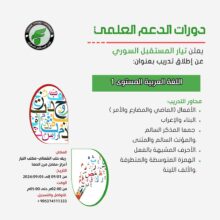Healthcare for Children in Syria: Reality and Challenges

Introduction:
The Syrian crisis is considered one of the most severe humanitarian crises of the modern era, having left a profound impact on the health of children in particular.
According to certain statistics and figures regarding the dire health conditions faced by Syrian children, over half of children under the age of five suffer from stunting, according to UNICEF—an indicator of chronic malnutrition that affects both physical and mental development.
Statistics also indicate a sharp rise in acute malnutrition rates among children, making them more vulnerable to illness and death.
Regarding infectious diseases, there is a widespread outbreak of waterborne diseases. Due to contaminated water sources and a lack of sanitation, infectious diseases such as diarrhea and cholera have spread widely among children.
The war and displacement have also led to a significant decrease in vaccination rates, increasing the risk of outbreaks of preventable diseases such as measles and polio.
As for mental health, Syrian children suffer from deep psychological trauma due to violence, displacement, and the loss of loved ones, which affects their mental health and social development.
Studies indicate a rise in depression, anxiety, and other psychological disorders among Syrian children.
Moreover, the healthcare sector in Syria suffers from a severe shortage of medicines and medical supplies, which impacts the quality of healthcare provided to children.
Our focus on this issue stems from concern over the long-term effects of inadequate healthcare. Malnutrition and psychological trauma lead to delays in children’s physical and mental development, limiting their future opportunities.
Efforts and Activities:
The efforts of the United Nations and partner organizations in the field of child healthcare are evident through the Convention on the Rights of the Child. This convention serves as a global constitution for children’s rights, ensuring their right to health, including primary healthcare, nutrition, and disease prevention.
UNICEF focuses on providing essential health services for children, such as immunization, nutrition, safe drinking water, and sanitation. It also works to combat life-threatening diseases like malaria and AIDS.
The World Health Organization (WHO) establishes global standards for child healthcare and supports countries in implementing these standards, focusing on both infectious and non-infectious diseases affecting children.
Joint efforts like immunization programs aim to protect children from vaccine-preventable diseases, such as measles and polio.
In addition to fighting malnutrition, organizations provide supplementary food for children, promote breastfeeding, and combat stunting.
There is also an emphasis on access to clean water and sanitation, which helps prevent waterborne diseases and improves children’s overall health.
Primary healthcare is another focus, aiming to provide comprehensive health services for children within local communities.
For protecting children from violence and exploitation, organizations work to safeguard them from all forms of violence and abuse, offering psychological support as well.
The efforts of the United Nations and partner organizations in child healthcare have achieved significant progress, yet much work remains to be done. All concerned parties—governments, international organizations, and civil society—must cooperate to ensure that all children receive the healthcare they deserve.
Challenges:
Child healthcare efforts face numerous complex challenges that hinder the achievement of their goals.
The challenges can be divided into:
- Structural Challenges:
- A. Poverty: Poverty is one of the biggest barriers to accessing healthcare for children, limiting families’ ability to afford treatment, medication, and proper nutrition.
- B. Inequality: There are significant gaps in access to healthcare between urban and rural areas, rich and poor countries, and different social groups.
- C. Resource Shortages: Many countries suffer from a lack of financial and human resources necessary to provide adequate healthcare services for children.
- D. Healthcare Infrastructure: Weak healthcare infrastructure, such as hospitals and health centers, limits the ability of countries to deliver effective healthcare services.
- E. Conflicts and Wars: Wars and armed conflicts lead to the destruction of healthcare infrastructure and displacement of populations, negatively impacting children’s health.
- Health-Related Challenges:
- A. Infectious Diseases: Infectious diseases such as malaria, AIDS, and tuberculosis continue to pose a significant threat to children’s health, especially in developing countries.
- B. Malnutrition: Millions of children worldwide suffer from malnutrition, affecting their physical and mental growth and development.
- C. Non-Communicable Diseases: Rates of non-communicable diseases, such as diabetes and cardiovascular diseases, are increasing among children due to factors like poor nutrition and lack of physical activity.
- Policy and Program Challenges:
- A. Coverage Shortage: Millions of children still lack access to essential health services, such as immunization and nutrition.
- B. Quality of Services: Many countries struggle with low quality in health services provided to children, affecting their effectiveness.
- C. Intersectoral Integration: Efforts to improve child health often lack integration across different sectors, such as health, education, and nutrition.
- D. Climate Change: Climate change negatively impacts children’s health by increasing the spread of vector-borne diseases, worsening malnutrition, and causing natural disasters.
- Behavioral Challenges:
- A. Harmful Health Practices: Certain harmful health practices, such as early marriage and female genital mutilation, continue to pose significant challenges to girls’ health.
- B. Lack of Awareness: Many people lack awareness of the importance of preventive healthcare for children, leading to delays in seeking medical care.
There are also many specific challenges faced by Syrian children, which go beyond the general challenges of child healthcare mentioned earlier. These challenges are significantly influenced by the ongoing war, displacement, and difficult living conditions.
Some of the main challenges faced by Syrian children, which we have identified in the Family Affairs Office of the Syrian Future Movement:
- Psychological trauma: Syrian children experience deep psychological trauma due to violence, displacement, and the loss of loved ones. This significantly affects their growth and development and can lead to long-term psychological disorders.
- Education: Many Syrian children face interruptions in their education or struggle to integrate into new educational systems, affecting their future prospects.
- Early marriage: Syrian girls face the risk of early marriage, depriving them of their childhood and affecting their physical and mental health.
- Child labor: Many Syrian children are forced to work to support their families, depriving them of their right to play and learn.
- Violence and exploitation: Syrian children are at risk of violence and exploitation, including recruitment by armed groups and human trafficking.
- Displacement and refugee status: Millions of Syrian children live as refugees in neighboring countries, making them vulnerable to discrimination and racism.
These challenges interact with each other and significantly impact the health and well-being of Syrian children.
Some potential consequences of these challenges include:
- Malnutrition: Many Syrian children suffer from malnutrition, which affects their physical and mental growth.
- Infectious diseases: The risk of infectious diseases increases due to inadequate health conditions in camps and cities affected by the war.
- Developmental delays: Many Syrian children experience delays in physical and mental development due to psychological trauma and malnutrition.
- Chronic health issues: Syrian children may suffer from chronic health problems as a result of the physical and psychological trauma they have endured.
The Empowerment Question:
Empowering children’s healthcare in Syria under the challenging conditions the country is experiencing requires a concerted effort at multiple levels. Some suggestions include:
- International Support:
- A. Increase Humanitarian Aid: Humanitarian aid should be increased to meet the urgent medical needs of children, provide medicines and medical equipment, and support healthcare infrastructure for children.
- B. Facilitate Aid Access: Humanitarian aid must be facilitated to reach besieged and hard-to-reach areas, including regions where displaced and refugee children are located.
- C. Support the Rehabilitation of Healthcare Infrastructure for Children: Efforts should be made to rebuild and rehabilitate hospitals and healthcare centers that provide services to children, equipping them with necessary devices and equipment.
- D. Train Medical Personnel Specializing in Child Health: Training programs should be provided for medical personnel specializing in child health to enhance their ability to deliver healthcare to sick and injured children.
- Role of the De Facto Authorities:
- A. Rebuild the Healthcare System for Children: The healthcare system for children must be comprehensively rebuilt, focusing on primary healthcare for children, including vaccinations and regular check-ups.
- B. Provide Essential Medicines for Children: Essential medicines for children should be made available at affordable or no cost, especially medicines for common childhood diseases.
- C. Combat Corruption in the Health Sector: Corruption in the health sector should be fought to ensure that aid reaches the children in need.
- D. Provide a Safe Environment for Healthcare Workers for Children: A safe environment for healthcare workers must be provided to protect them from danger and enable them to deliver their services freely.
- Role of Non-Governmental Organizations:
- A. Provide Basic Healthcare Services for Children: NGOs must provide basic healthcare services for children in areas suffering from a lack of services, such as vaccinations, nutrition, and primary healthcare.
- B. Support Children’s Mental Health: Mental health support should be provided to children affected by war and displacement through psychological therapy programs and social rehabilitation.
- C. Health Awareness for Mothers: Health awareness campaigns should be conducted for mothers regarding the importance of children’s healthcare and how to prevent common diseases.
Empowering healthcare for children in Syria requires a collective effort from all concerned parties and should be part of a comprehensive solution to the Syrian crisis. The focus must be on providing primary healthcare for children, ensuring the availability of essential medications, training medical staff, and building a strong and sustainable healthcare system for children.
Conclusion:
Civil society in Syria represents the backbone of healthcare support, especially in light of the difficult conditions the country is facing. It plays a vital role in filling the gaps left by official entities and providing essential services to citizens, particularly the most vulnerable groups such as women and children.
As we are part of this civil society in the Family Affairs Office of the Syrian Future Movement, we share our experience through our presence in northern Syria to support healthcare:
- Providing direct healthcare services by establishing mobile and fixed clinics to deliver primary healthcare services.
- Organizing large-scale vaccination campaigns for children.
- Providing mental health services and psychosocial support for those affected by the conflict.
- Offering therapeutic nutrition services for children suffering from malnutrition.
- Health awareness through organizing awareness campaigns on common diseases and how to prevent them.
- Disseminating health information through various media outlets.
- Training community health workers to provide first aid and health awareness.
- Research and studies by conducting studies and research on the health needs of local communities.
- Documenting violations affecting the healthcare sector.
- Advocacy and lobbying by pressuring official authorities and international organizations to provide financial and logistical support for the healthcare sector.
- Advocating for improved access to healthcare services for all members of society.
- Participating in the formulation of national healthcare policies.
- Building partnerships with other international and local organizations working in the health sector.
- Strengthening cooperation with the private sector.
- Training medical and community health personnel to provide basic healthcare services.
- However, like the civil society, we face a significant funding shortage, limiting our ability to provide services.
- Humanitarian organizations operating in Syria also encounter numerous legal and administrative challenges.
- Additionally, it is difficult for organizations to access besieged areas to provide aid.
- Humanitarian workers are also exposed to violence and security threats.
Supporting civil society in Syria is vital to ensure the continuity of healthcare services for citizens, especially the most vulnerable groups. This can be achieved through:
- Providing financial support: Offering grants and loans to organizations working in the healthcare sector.
- Facilitating administrative procedures: Simplifying the administrative processes faced by organizations operating in Syria.
- Building partnerships: Establishing strong partnerships between government and non-governmental organizations.
- Providing protection for humanitarian workers: Ensuring the safety of humanitarian workers and protecting them from any threats.
Civil society plays a vital role in supporting healthcare in Syria. At our base in northern Syria, we have presented plans and projects that we are working to complete, and we will later provide a detailed study on our website. However, we recognize that civil society faces many challenges. Therefore, supporting this sector is an investment in Syria’s future and ensures that all citizens receive the healthcare they deserve.
Family Affairs Office
Research Team
Research and Studies Department
Articles
Syrian Future Movement






